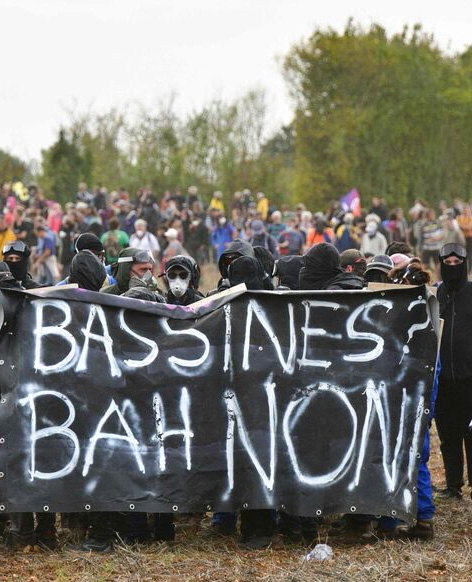Since the beginning of the year, we have witnessed the recurring spectacle of the extensive use of state violence against environmental movements. Despite their undeniable significance, these events received minimal coverage from the mainstream media. In the following paragraphs, I will provide a brief overview of two such incidents.
Lützerath
Between January 14 and 16, the village of Lützerath in Germany was occupied by environmental and anti-capitalist activists who strongly opposed the expansion of a lignite mine belonging to the company RWE. Lignite coal is regarded as one of the most environmentally harmful forms of fossil fuels, being approximately twice as detrimental as natural gas. This mine expansion was approved by the German state, ostensibly due to the alleged unavailability of Russian gas imports amid the conflict in Ukraine. However, experts have demonstrated that an increase in coal production was unnecessary to fulfill Germany's energy requirements during these circumstances. Consequently, thousands of demonstrators from across Europe rallied against this ecocidal project, which not only posed a severe threat in terms of greenhouse gas emissions but also jeopardized arable land within the village of Lützerath.
Some individuals joined the activists who had already occupied the village for several months, barricading themselves within, while others formed groups in the fields surrounding the stronghold. In total, there were at least 35,000 demonstrators. Faced with these protesters obstructing their Machiavellian plans, the company sought the intervention of the State, which deployed its police to enforce the sacrosanct laws of private property. Adding to the indignity of the situation, these police forces were transported using company trucks, among other vehicles. Predictably, clashes erupted as the police moved to disperse the demonstrators, resulting in injuries to dozens of protestors, with approximately twenty of them requiring hospitalization. In addition to the physical violence, state authorities employed the well-documented strategy of legal harassment, initiating legal proceedings against nearly 150 individuals.
Isn't this evidence that the State currently prioritizes the profits of major corporations over the welfare of its citizens and the future of humanity? If you remain unconvinced, let me present another, perhaps even more compelling, example of this very trend.

Sainte-Soline
On March 25, approximately 6,000 environmental activists and farmers gathered in Sainte-Soline, France, to protest against the construction of a megabasin—an artificial reservoir designed to store groundwater for agricultural irrigation. The organization "Les Soulèvements de la Terre" (the “Earth Uprisings”), which spearheaded this mobilization, opposes the development of this infrastructure because it jeopardizes water reserves, particularly groundwater tables, during droughts and privatizes access to water. They also hold a broader stance against industrial agriculture, viewing megabasins as a means of perpetuating its environmentally destructive and wasteful practices.
The protesters sought to occupy the under-construction megabasin, but they were met by a horde of heavily armed police officers. The police launched an onslaught, firing a total of nearly 4,000 tear gas and sound bombs, not to mention their extensive use of rubber bullet guns. This brutal attack resulted in injuries to 200 demonstrators, including approximately forty who sustained severe injuries and two who fell into comas. The carnage was compounded by the fact that the police obstructed ambulance drivers from reaching the site of the massacre for several hours.
This unrestrained state violence aimed to silence the voices of the farmers who were confronting the threat of water privatization during a period of drought and climate change.
The same violence
In both Germany and France, we witnessed the embodiment of state violence as they wholeheartedly aligned themselves with capitalist interests, opposing those who simply aim to safeguard the habitability of the planet for all human beings. This violence is by no means confined to Europe. As you are likely aware, it manifests itself perhaps even more brutally on the other side of the Atlantic, in what is known as Canada. This is notably illustrated by the neocolonial deployment of the RCMP on Wet’suwet’en territory to enforce the passage of the Coastal GasLink gas pipeline, generously financed by the Royal Bank of Canada. It is imperative that we recognize this as a universal issue and foster solidarity among various decolonial, environmentalist, and anti-capitalist movements worldwide. We all confront a common adversary: Capital, protected by the State.
